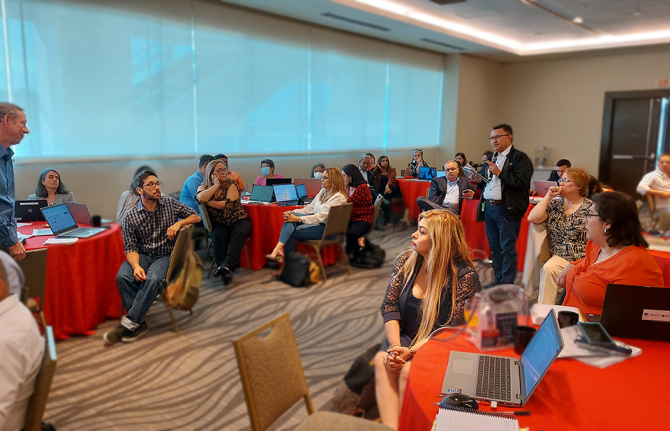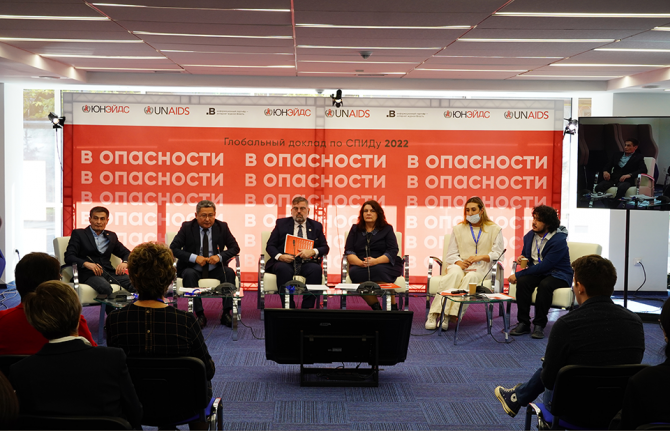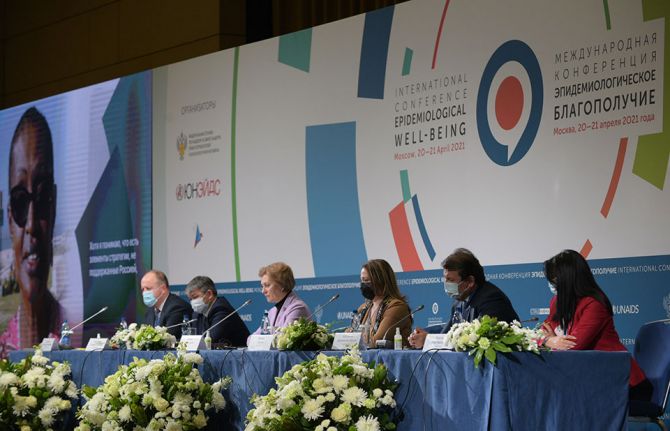
Feature Story
Third Asia Pacific Ministerial Meeting on HIV/AIDS
24 July 2007
24 July 2007 24 July 2007
The aims of the meeting was to further encourage
business support for and commitment to the
AIDS response in the region.
Photo credit: UNAIDS/O.O'Hanlon
Business & Government against AIDS
In efforts to further strengthen the response to the epidemic in the region, the Australian Agency for International Development, AusAID, and the Asia Pacific Business Coalition Against AIDS, APBCA, brought together business and government representatives and Ministers for the Third Asia Pacific Ministerial Meeting on HIV/AIDS.
The meeting, which took place in Sydney, Australia on 23 July, was convened to further encourage business support for and commitment to the AIDS response in the region. Its aim also was to build on the goals expressed by Ministers from the region through the previous two ministerial meetings to 'promote high-level leadership and partnership among key stakeholders in combating AIDS in the region.'
“The purpose of this meeting is to highlight and strengthen the partnership between government and business in the fight against AIDS - to strengthen the networks and services that are the front line response to the epidemic in the region, said The Hon Alexander Downer MP, Australian Minister for Foreign Affairs in his opening speech. “The next five years will be critical in terms of preparing for the impact of AIDS and scaling up prevention, especially if we want to meet the Millennium Development Goal of halting and beginning to reverse the spread of HIV/AIDS by 2015,” he added.
The impact of AIDS on the private sector was a central theme of the discussions with lessons being drawn from the effects seen in Africa. Issues highlighted were the rising costs related to AIDS on businesses including absenteeism due to illness or attending funerals, burial costs, health care benefits, and recruitment and training of new labour to replace that lost to AIDS.
During his presentation Michel Sidibe, Deputy Executive Director of Programmes, UNAIDS said, “ Every person living with HIV who needs anti-retroviral treatment must have access to it and the more access we have to effective prevention, the fewer people will be in need of treatment.”
The meeting coincided with the International AIDS Society Conference which is being held in Sydney from 22-25 July 2007. (visit the conference web site)
Background - Asia Pacific Ministerial Meeting on HIV/AIDS
In 2001, building on the momentum from the UN General Assembly Special Session on HIV/AIDS, the Australian Government hosted the first Asia Pacific Ministerial meeting on HIV/AIDS. Ministers from 33 countries in the region came together to discuss the challenges posed by AIDS in the region and to identify ways to strengthen partnerships to respond to the epidemic.
The Thai Government hosted the second ministerial meeting in Bangkok in 2004. The theme of this meeting was Access for All: Political Accountability and focused on multi-sectoral action and the important role of political leadership in the response to AIDS in the region.

The coalition assists business respond to AIDS by
providing quality resources and services.
Photo credit: UNAIDS/O.O'Hanlon
The Asia Pacific Business Coalition on AIDS
The Asia Pacific Business Coalition on AIDS was established as a direct response to the need for greater private sector engagement, coordination and commitment to the regional fight against AIDS. It was launched by Former US President, Bill Clinton in February 2006.
Members include many of Australia's top companies including Qantas and BHP Billiton.
The coalition assists business respond to AIDS by providing quality resources and services to support best practice approaches to AIDS in the region.
Links:
The Asia Pacific Business Coalition on AIDS
The Australian Government’s aid programme AusAID
The Global Business Coalition on HIV/AIDS

Feature Story
4th IAS Conference on HIV Pathogenesis, Treatment and Prevention, Sydney 2007
20 July 2007
20 July 2007 20 July 2007Sydney AIDS Conference reports on scientific advances in HIV treatment and prevention
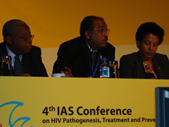
The 4th IAS Conference on HIV Pathogenesis, Treatment and Prevention came to a close in Sydney, Australia today. More than 5,000 delegates from 133 countries came together for the four-day conference to examine the latest developments in HIV-related research.
24 July 2007

MSM Initiative launched at Sydney AIDS Conference
It’s an unfortunate reality that all too often, the people most at risk and most in need of HIV prevention, treatment and care programmes are those least likely to have access to these services. For example it is estimated that fewer than one in 20 men who have sex with men around the world have access to HIV prevention, treatment, and care services.
In a bid to scale up action and stop the spread of HIV among men who have sex with men, the Foundation for AIDS Research, amFAR has launched an initiative to support grassroots MSM organizations at the International AIDS Conference in Sydney.
Tuberculosis and HIV: the dual epidemic
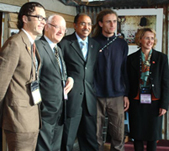
In order to help convince the HIV research community of the need for more research into improving prevention, diagnosis and treatment of TB among people living with HIV, UNAIDS is supporting an emotive exhibition at the Sydney AIDS conference portraying, in words and pictures the double impact that TB and HIV has on people and communities in South Africa and Zambia.
Roadmap to TB/HIV sessions at Sydney AIDS Conference
21 July 2007

Opening ceremony
Photo credit: IAS
Bridging the gap between research and practice
Over 5000 people are gathering in Sydney, Australia to attend the fourth conference on HIV Pathogenesis, Treatment and Prevention. The conference, taking place on 22-25 July 2007, features the latest developments in HIV biology, pathogenesis, treatment and prevention science.

Feature Story
4th IAS Conference on HIV Pathogenesis, Treatment and Prevention opens in Sydney
20 July 2007
20 July 2007 20 July 2007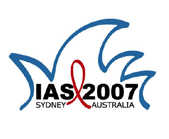
The Australian Society for HIV Medicine and the International AIDS Society are hosting the 4th IAS Conference on HIV Pathogenesis, Treatment and Prevention in Sydney, Australia from 22-25 July 2007.
Over 5000 delegates are expected to attend the conference which features the latest developments in HIV biology, pathogenesis, treatment and prevention science.
Held every two years, the conference is an opportunity for leading scientists, clinicians, public health experts and community leaders to examine the latest developments in HIV-related research, and to explore how scientific advances can inform the global response to AIDS.
This is the first IAS conference encompassing “Biomedical Prevention” in addition to Pathogenesis and Treatment, in line with the decision to include biomedical prevention made during the 2005 meeting in Rio de Janeiro.
The biomedical prevention track will focus on strategies for preventing HIV transmission that have a biomedical basis, such as vaccines, microbicides, chemoprophylaxis and substitution therapy for drug dependence.
Deputy Executive Director of Programmes at UNAIDS, Michel Sibide, will participate in events around treatment, sustainability in the era of universal access, the TB/HIV co-epidemic and men who have sex with men in Asia. Chief Scientific Adviser Dr Cate Hankins will be launching new guidelines on ethics and good practice in trials.
Links:
Visit the conference web site
Visit the International AIDS Society web site

Feature Story
Improving national and regional HIV estimates
20 July 2007
20 July 2007 20 July 2007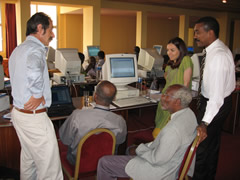
Estimates workshops have been designed to enable
epidemiologists to develop the best possible
HIV estimates for their country.
Photo credits: UNAIDS
Between March and June 2007, national epidemiologists, analysts and heads of AIDS programmes from 124 countries have taken part in specialist UNAIDS training to improve and refine country HIV estimates.
Eleven regional training workshops have been conducted around the world to bring epidemiologists up to date with the latest developments in estimates tools and software packages including updated assumptions based on new evidence from research and added new features.
The workshops are intended to build capacity in countries to produce updated 2005 and provisional 2007 estimates. Global and regional estimates based on these preliminary country estimates will be published at the end of 2007 in the 2007 AIDS Epidemic Update and new country estimates will be published in the 2008 UNAIDS Report on the global AIDS epidemic in time for the 2008 International AIDS Conference in Mexico.
“These trainings have been designed to enable epidemiologists to develop the best possible HIV estimates for their country, based on the latest improvements in data collection methods,” said Karen Stanecki, UNAIDS senior epidemiological advisor, who helped facilitate the workshops. “Epidemiologists will be able to develop data to inform different aspects of the AIDS response, such as the number people living with HIV, new HIV infections, need for antiretroviral treatment, and the number of deaths and orphans related to AIDS,” she said.
Since 1997 country specific estimates of the burden of HIV infection have been published by UNAIDS and WHO on a regular basis. The methods and assumptions used to produce HIV estimates have been improved based on increased knowledge of the HIV epidemic and its dynamics in different populations. The development of these methods has been guided by recommendations of the UNAIDS Reference Group on Estimates, Modelling and Projections.
Over the past few years specific software programmes have been developed, including the Workbook and the Estimation and Projection Package (EPP) to generate an epidemic curve of the HIV epidemic, based on sentinel HIV sero-surveillance data. Another software package (Spectrum) uses the epidemic curve as an input, and generates estimates of prevalence, incidence, and AIDS-related mortality, as well orphans. Some of the Spectrum outputs include as denominators for Monitoring and Evaluation indicators for prevention of mother to child transmission and antiretroviral treatment need. These software packages have been used by UNAIDS and WHO to produce the 2001, 2003 and 2005 estimates.
Bringing participants up to date with the latest in new data collection developments, the specialist training workshops were held across all regions in South Africa (two sessions), Senegal (two sessions), Thailand (two sessions), Panama (two sessions), Trinidad and Tobago, the Russian Federation and Egypt.
Strengthening regional methods
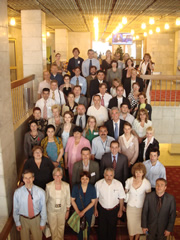
Participants of the MAP meeting in
Moscow identified the main
determinants of the epidemic in the
region and analyzed its impact.
Photo credits: UNAIDS
Further developing methods and practices for greater data collection, the second “ Commonwealth of Independent States Monitoring the AIDS Pandemic (MAP) meeting” was conducted in Moscow , Russian Federation , 25-27 June 2007. The meeting brought together eighty participants and observers from the twelve countries of the Commonwealth of Independent States, including experts from the National AIDS Programmes of Azerbaijan, Armenia, Byelorussia, Georgia, Kazakhstan, Kyrgyzstan, Moldova, Russia, Ukraine, Uzbekistan, Tajikistan and Turkmenistan.
“The meeting was especially significant since it was the first time in ten years that this group of regional experts had assembled to examine the trends that are driving one of the world’s fastest growing HIV epidemic,” said Liliya Mialeshko, Head of the AIDS Prevention Department of the Republican Center for Hygiene, Epidemiology and Public Health in Belarus, who participated in the meeting.
Supported by technical guidance from the UNAIDS Secretariat, the World Health Organization and the U.S. Centers for Disease Control, as well as UNAIDS’ co-sponsors, donors and non-governmental organizations, the meeting allowed participants to assess the main determinants of the epidemic in the region, review trends in biological and behavioural surveillance, and share best practices in the collection and use of data to guide the response to the epidemic. The MAP meeting was followed by the final regional HIV estimates training workshop.
“Both the MAP meeting and the estimations workshops have helped further the critically important work of identifying the main drivers of the epidemic in the region and determining its impact. By helping countries to better “Know Their Epidemics”, they will be better able to develop an effective response,” said Karen Stanecki.
UNAIDS is now working individually with country representatives to finalize the report from the regional meeting and develop plans for further follow-up.
Related

Feature Story
Lesotho’s church leaders step up AIDS response
18 July 2007
18 July 2007 18 July 2007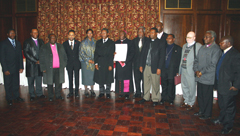
Lesotho Church Leaders together with the Right
Honorable the Prime Minister, Mr. Pakalitha
Mosisili, Mrs. Hodan Haji Mohamed, UN Resident
Coordinator and Mr. Mahesh Mahalingam,
UNAIDS Lesotho Country Coordinator.
Photo credits: UNAIDS
Fourteen prominent church leaders in Lesotho have signed a statement of commitment on AIDS, pledging to confront the epidemic and to support people living with HIV in a united front.
In the presence of His Majesty King Letsie III and the Rt. Honorable Prime Minister Bethuel Mosisili, the religious leaders underlined their commitment to help Lesotho achieve universal access to HIV prevention, treatment, care and support.
The Kingdom of Lesotho has one of the highest HIV prevalence in the world, with 23.2% of people aged 15-49 estimated to be living with HIV. According to the National AIDS Commission (NAC) and UNAIDS, some 29,000 new infections are estimated to occur in 2007.
In Lesotho – as across Africa – religious organizations provide a considerable percentage of care and support for people living with HIV as well as education and care for children and orphans affected by HIV. About 90% of schools in Lesotho are owned by the church as well as over 50% of hospitals.
In most communities, especially those in rural parts of the country, religious leaders play an important role in people’s lives; they are seen as spiritual pillars and are a trusted source of guidance, moral support and advice on everyday issues. "Bishops, reverends and pastors provide spiritual and psychological support to families and children affected by HIV, especially orphaned and vulnerable children. They also help mobilize community support and overcome silence, denial and fear,” said Mahesh Mahalingam, UNAIDS Country Coordinator in Lesotho.
Speaking at the signing of the declaration, Presiding Superintendent, Reverend Mokhakhlane, from the Lesotho Evangelical Church, underlined the need for urgent action on AIDS from religious leaders. “The tragic toll of the AIDS epidemic, brings compelling urgency to the call for a renewed commitment by religious leaders to achieve universal access for all to HIV prevention, treatment, care and support as well as impact mitigation”, he said.
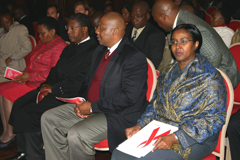
From L to R, The Right Honorable the Prime
Minister, Mr. Pakalitha Mosisili, His Majesty King
Letsie III, and Mrs. Hodan Haji Mohamed, UN
Resident Coordinator. Photo credits: UNAIDS
Archbishop B. Mohlalisi, Roman Catholic Church, reiterated the importance of a united front on AIDS by religious leaders. “As church leaders we have committed ourselves before our people to show them that they are not alone, we are united in this mission and are all accountable to one another and will work hand in hand to find innovative solutions to respond to this crisis,” he said.
Through the declaration, church leaders pledged to promote dignity, equality and rights of all people, especially those living with HIV; to discuss openly about AIDS and about effective means of HIV prevention; to reject negative statements that AIDS is a form of ‘divine’ punishment; and to support effective HIV preventive education, comprehensive care and treatment, impact mitigation and full inclusion of people living with and affected by HIV in the community. The leaders underlined their support for the elimination of gender inequality and negative social and cultural practices that can increase vulnerability to HIV infection. The religious leaders vowed to implement policies, strategies and frameworks within religious institutions and structures to combat any marginalization of people living with or affected by HIV.
“This is the first time that the ecumenical society has spoken out with one powerful voice, and we are strategically placed to reach people from all walks of life and be catalysts for positive and lasting action” said Reverend Daniel Rantle from the Methodist Church of Africa.
The National AIDS commission and the United Nations have been collaborating closely with religious leaders and faith based organisations in Lesotho to respond to AIDS. In partnership with groups such as Catholic Relief Services, and World Vision, the National AIDS Council and UNAIDS organized a specialized AIDS training of senior church leaders in June 2007.
Links:
More on Lesotho
Download the Statement of Commitment by Lesotho's Church Leaders on AIDS (pdf, 342 Kb)
Related

Feature Story
China: UNAIDS awards leadership excellence
17 July 2007
17 July 2007 17 July 2007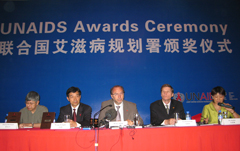
UNAIDS acknowledged good progress that has been made in China’s response to AIDS, presenting special awards to China’s Vice Minister of Health, Dr Wang Longde and Professor Zhang Beichuan from Qingdao University, for their leadership on AIDS issues.
UNAIDS today acknowledged good progress that has been made in China’s response to AIDS, presenting special awards to China’s Vice Minister of Health, Dr Wang Longde and Professor Zhang Beichuan from Qingdao University, for their leadership on AIDS issues.
At an awards ceremony held Beijing, UNAIDS Executive Director Peter Piot congratulated Dr Longde and Professor Beichuan for their dedication and commitment to helping China get ahead of its AIDS epidemic and establish a sustainable, multi-sectoral response.
“ As I visit countries around the world, I witness time and again that strong and committed leadership brings progress in the AIDS response,” he said.
“ Today I am honored to present awards to two true pioneers, who have been at the forefront of the AIDS response in the country and who have encouraged others to follow,” he added.
“ This kind of enlightened leadership on AIDS is critical to getting ahead of the epidemic and keeping the challenges AIDS presents high in the minds of policy makers and the general public,” said Dr Piot.
Dr Wang Longde has been China’s Vice Minister of Health since 1995. He completed his graduate study at China Academy of Medical Sciences before holding the position Health Bureau Director in the Gansu Province. Dr Wang Longde has been instrumental in making a response to AIDS a priority for China. He has placed particular emphasis on ensuring a multisetoral approach to AIDS and encouraging a range of partners to join China’s response.
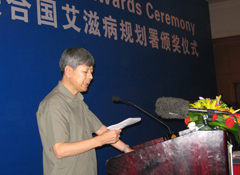
Professor Zhang Beichuan addresses government
officials, UN and NGO representatives, people
living with HIV and the press after receiving a
UNAIDS award from UNAIDS Executive Director,
Dr. Peter Piot.
Professor Zhang Beichuan from Qingdao University and a member of National AIDS Expert Committee, has undertaken ground-breaking work in raising HIV awareness among men who have sex with men, breaking down stigma and discrimination against people at high risk of HIV infection and developing focused HIV prevention programmes. Professor Beichuan has been working on AIDS issues since the mid-1980s when he started sexual education programming. In the early 1990s he started research on homosexuality, publishing his first paper in 1994, where he also dealt with AIDS among men who have sex with men as an issue. Professor Beichuan implemented one of the earliest large-scale HIV interventions among men who have sex with men in China.
The UNAIDS award ceremony took place as part of a week-long country visit to China by the UNAIDS Executive Director, to learn more about how the country is intensifying and moving forwards its response to AIDS. The mission travelled through Henan, one of the provinces most affected by AIDS – visiting Shangcai county and the provincial capital Zhengzhou. Following the Henan mission, Dr Piot travelled on to the Chinese capital Beijing.
During the week long trip, the UNAIDS Executive Director is highlighting a number of key issues such as the need for continued and sustained commitment and leadership on AIDS, the need for focused HIV prevention programmes to reach the people most at risk and the continued need to reduce AIDS-related stigma and discrimination in China.
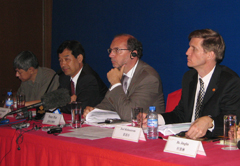
L to R: Professor Zhang Beichuan, Vice Minister of
Health Dr. Wang Longde, UNAIDS Executive
Director Dr Peter Piot, UNAIDS Country Coordinator
Joel Rehnstrom
“I am confident that China can continue scaling up its response to AIDS, focusing programmes to reach the people that need them most, involving people living with HIV and “making the money work” – ensuring the funding available for AIDS is used most effectively and efficiently. It is still early to tell, but China might just be turning the corner on AIDS”, said Dr Piot.
UNAIDS has been supporting efforts to curb the AIDS epidemic in China for over ten years. As part of the mission, Dr Piot will also discuss United Nations continued support to China and promote the new ‘UN Joint Programme on AIDS’ that has been developed in the country. The new programme includes a clear division of labour between UN agencies working on AIDS and aims at ensuring that the United Nations ‘delivers as one’ on AIDS.
“As China’s response develops, so does the UN response within the country. Increased coordination will enable us all to be more effective. We look forward to supporting China in its response to AIDS and working together with China in expanding the global response to AIDS, particularly in Africa”, the UNAIDS Executive Director said.
Links:
Read press release
Read more on the UNAIDS' visit to China - Partnership central to China’s AIDS response
More information on China
Visit the UNAIDS China web site

Feature Story
Partnership central to China’s AIDS response
16 July 2007
16 July 2007 16 July 2007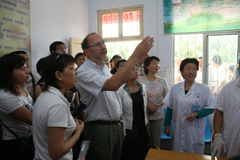
UNAIDS Executive Director, Dr Peter Piot reviews
the flow chart for diagnosis of HIV in the health
clinic of Nandawu village in Shangcai county in
Henan province together with health clinic staff.
Leadership, commitment and ensuring the involvement of a wide range of partners in the AIDS response– including people living with HIV –have been underlined as critical to progress on AIDS in China, during a week-long UNAIDS mission to the country (15 – 20 July).
Heading the mission, UNAIDS Executive Director Peter Piot stressed the need for all those working on AIDS to be fully involved in the development and implementation of the China’s response. He also highlighted the need for focused HIV prevention programmes to reach the people most at risk and the continued need to reduce AIDS-related stigma and discrimination in the country.
The mission travelled through Henan, one of the provinces most affected by AIDS – visiting Shangcai county and the provincial capital Zhengzhou. According to Chinese government estimates, some 66,000 people are thought to be living with HIV in the province.
Key discussions with provincial leaders and visits to a health clinic, a primary school, a centre for AIDS orphans and two households of people living with HIV gave insight into progresses being made and ongoing challenges faced.
Henan has a comprehensive HIV prevention, treatment, care and support system with over $100 million invested by the provincial government over the last 4 years. Free antiretroviral treatment and treatment for opportunistic infections is available in hundreds of villages and towns across the province. During the mission, healthcare workers in the province stressed the importance of ensuring second line treatment is made available and addressing the potential reality of emergence of drug resistance. They also underlined the need for expanded availability of opportunistic infection treatment.
“There are 129 free drugs for treatment of opportunistic infections. But we still hope that some more drugs, such as drugs for hypertension treatment will become free of charge,” a member of the staff told UNAIDS at the health clinic in Nanawu village.
Despite increased attention to AIDS in the province, the involvement of non-governmental, community based organizations and people living with HIV within the response has been rather limited. Addressing this issue, the UNAIDS Executive Director held special discussions with a group of civil society representatives – including representatives of media, non-governmental organizations and people living with HIV to explore ways of strengthening their active involvement in the response to AIDS in Henan. Coordinated action and the issue of stigma and discrimination were high on the agenda, with participants underlining that some progress has been seen on reducing AIDS-related discrimination but that more was needed to ensure civil society and people living with HIV can have the opportunity and space to be active within the response. “There is still a definite need for improvement,” said one non-governmental organization representative.
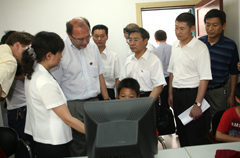
UNAIDS Executive Director, Dr Peter Piot observes
a boy using a computer at the Red Ribbon Care
Centre for AIDS orphans of Nandawu village in
Shangcai county, Henan province. Local staff and
Dr. Ma Jiangzhou, Director of the Henan Province
Health Bureau are also present.
Visiting households of people living with HIV, Dr Piot emphasized the critical role individuals have to play in ensuring an effective response to AIDS. “People living with HIV should be at the very centre of the response. Your voices must be heard,” he said, urging them to participate in HIV prevention and anti-discrimination campaign s and reach out to others in the community.
Young people, their role in the response and the need to raise their awareness on AIDS issues was also highlighted through discussions at the Nandawu Village primary school and the Red Ribbon Care Center for AIDS Orphans.
Joining the children in the Red Ribbon Centre in their daily sporting activities, Dr Piot stressed the critical role of the school system in increasing AIDS prevention, anti-discrimination and life skills education as well as vocational training. He also called for provincial and educational leaders to give more attention to children and young people on AIDS, as they are among the most vulnerable to HIV infection.
Following the Henan mission, Dr Piot travelled on to the Chinese capital Beijing. Over the next days he will meet with Chinese government officials and hold talks with Chinese AIDS experts and activists.
Links:
More information on China
Visit the UNAIDS China web site

Feature Story
Love, live, dream: women against AIDS in Armenia, Moldova, Kazakhstan, Russia, Ukraine
13 July 2007
13 July 2007 13 July 2007During a nine day tour of five countries of the Commonwealth of Independent States, a group of HIV advocates met with policy makers and civil society organizations to raise awareness on women and AIDS in this part of the world.
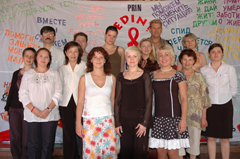
Women against AIDS tour was conceived in the
midst of a growing concern that women are
increasingly at risk of HIV infection in many parts of
Eastern Europe and Central Asia.
Women against AIDS tour was conceived in the midst of a growing concern that women are increasingly at risk of HIV infection in many parts of Eastern Europe and Central Asia. The percentage of adults living with HIV who are women has risen from 11% in 1990 to 28% in 2006.
The tour was sponsored by the AIDS Infoshare organization, UNAIDS, the Global Coalition of Women on AIDS and the United Nations Development Program. Ten AIDS advocates from the region with special guests joining at various points travelled together to learn about the realities of women and AIDS in different parts of the region and also to mobilize local policy makers to act on these issues.
In each of the capital cities of Armenia, Moldova, Kazakhstan, Russia, and Ukraine—the tour group joined with civil society organizations and groups of People Living with HIV (PLHIV) to talk about some of the most difficult issues such as stigma and discrimination and their consequences including losing children’s custody, being thrown out of the home and losing jobs.
“These are real issues,” said Deborah Landey, Deputy Executive Director of UNAIDS who joined the last part of the tour. “We have a collective responsibility to make a difference for women ,” she added.
The predominant mode of HIV transmission in the region remains through the use of non-sterile injecting drug equipment. However an increasing proportion of HIV infections — 37% of reported cases in 2005 — are estimated to occur during unprotected sexual intercourse. In Ukraine, the proportion of people infected with HIV through heterosexual transmission increased from 14% of new cases between 1999 and 2003 to over 35% of new cases in the first six months of 2006.
“We must look at every AIDS plan and strategy and ask whether it works for women,” emphasized Ms Landey. “This is our chance to curb the epidemic in this region,” she added.
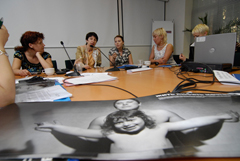
The Women Against AIDS also produced a set of
issues to be considered and recommendations when
developing national AIDS strategies in the region.
The tour ended where it started, with women. Sergei Golovach a renowned photographer and a guest on the tour took photos of his fellow advocates for an exhibit to be held called Love, Live and Dream. Through portraits h e wanted to emphasize that it does not matter who is HIV-positive.
“Just look at this photo,” said Ms Landey, remarking on one of the portraits of a mother and her daughter that has been turned into an advocacy poster. “It is all about a mother’s love—which has nothing to do with one’s HIV status.”
Moved by these portraits and what she learned from the tour participants, Elena Vasilieva, Editor in Chief of the Russian Cosmopolitan magazine promised to publish an article about the Women Against AIDS tour in the November edition. To help break down stereotypes she said “a glossy magazine is the right place to raise socially important topics.”
The Women Against AIDS also produced a set of issues to be considered and recommendations when developing national AIDS strategies in the region. Highlighting the critical importance of translating these recommendations into actions, Anna Dubrovskaya, from 'Golos anti-SPID' in Russia said “our wonderful recommendations will not work if there is nobody to demand from policy makers that they keep their promises. The most important thing is to not let this initiative die.”
Recommendations of the tour participants
We, the participants of the ‘Women Against AIDS’ project have visited five CIS countries to hold consultations with key stakeholders working in the field of HIV prevention, treatment and care. As a result of these consultations the project participants have developed the recommendations below. We believe that urgent measures should be taken to ensure women’s access to primary HIV prevention as well as access to treatment, care and support.
We would like to highlight a set of recommendations that we feel are of the greatest importance in each of our countries, regardless of differences in the stages of the epidemic or in social and economic development. We urge all interested parties to take these recommendations into consideration when developing national strategies to fight HIV/AIDS.
Specifically, we recommend:
- Implementation of information and education campaigns on primary HIV prevention targeted specifically at women, along with increased efforts to fight stigma and discrimination.
- Further development of programmes aimed at improving the quality of life of HIV-positive women, including programmes to ensure access to medical services not related to ARV treatment and reproductive health.
- Acceleration of programmes to ensure the social protection of HIV positive women.
- Increased research on the gender aspects of the HIV epidemic in Armenia, Kazakhstan, Moldova, Russia and Ukraine.
- Expanded efforts to guarantee the active involvement of women in decision-making processes at all levels.
- Additional state support for women’s initiatives to improve the quality of life of HIV positive women.
- Development of voluntary testing and pre- and post HIV test counseling services.
- Enhanced cooperation between various sectors, government and state organizations and civil society groups including those which are not yet directly involved in HIV prevention activities.
- Increased efforts to ensure respect for a woman’s choice related to reproductive health issues.
- Implementation of further needs assessments on HIV prevention, treatment, care and support for women.
- Support for the introduction of gender specific programmes, including support for the greater development of leadership and activism among women.
27 – 28 May 2007 Almaty (Kazakhstan)
29 - 30 May 2007 Yerevan (Armenia)
30 May - 1 June 2007 Chisinau (Moldova)
2 - 5 June 2007 Kyev (Ukraine)
6 June 2007 Moscow (Russian Federation)
Participants to the ‘Women Against AIDS’ Tour:
- Grekova Anna – ‘All-Ukrainian Network of PLHIV’, Kiev, Ukraine
- Dubrovskaya Anna – NGO ‘Golos-anti-SPID’, Ufa, Russia
- Zavalko Natalia – ‘AIDS infoshare’, Moscow, Russia
- Ivannikova Maria - ‘AIDS infoshare’, Moscow, Russia
- Polozkova Vera – Correspondent for ‘Cosmopolitan’ Magazine, Moscow, Russia
- Skibnevskaya Nina- ‘AIDS infoshare’, Moscow, Russia
- Slepneva Asya – Correspondent of Mayak Radio Station, Moscow, Russia
- Stupak Tatiana – NGO ‘ Victoria’, Pavlodar, Kazakhstan
- Tamazova Elena – UNAIDS, Moscow, Russia
- Untura Lyudmila – NGO ‘Childhood for All’, Chisinau, Moldova
- Golovach Sergei – Photographer, Moscow, Russia
All photo credit: UNAIDS/Serge Golovach
Links:
View photo gallery
Listen to interview with UNAIDS Deputy Executive Director Deborah Landey
Visit the Global coalition on women and AIDS' web site
Visit UNDP's web site
Visit AIDS Info Share's web site

Feature Story
Results of recent population-based surveys
05 July 2007
05 July 2007 05 July 20071. How have results of population-based surveys been used in refining AIDS estimates?
Since 2000 several countries have conducted nationally representative population-based surveys with HIV prevalence measurement. The first ones were conducted in Mali and Zambia in 2001-2002. By mid 2007 a total of 26 countries in sub-Saharan Africa had conducted surveys. In addition the two countries in the Caribbean with the largest HIV burden, Haiti and the Dominican Republic, as well as India and Cambodia in Asia had also conducted population-based surveys.
The information from available surveys has helped to refine UNAIDS published estimates. Where surveys were available prior to the publication of each of the UNAIDS biannual Global Report, the prevalence estimates from the survey have been used to inform the estimates in the UNAIDS Global Reports and consequently the two are very close to each other. As shown in the attached Table, all but one of these surveys (Uganda) has shown a lower prevalence in the survey compared to previously published estimates based on sentinel surveillance data.
The results of a number of surveys however have become available after the 2006 UNAIDS Global Report. Most of these have already been incorporated in the regional estimates published in the 2006 AIDS Epidemic Update, notably Cote d’Ivoire, Cambodia and Haiti. It is noteworthy that the recent survey in the Central African Republic showed a prevalence of 6.2% in 2006 compared to the published estimate of 10.7% for 2005. In other countries in sub-Saharan Africa recent estimates from the population based surveys are close to previously published estimates (Benin, Mali (2006), Niger (2006), Zimbabwe). In Asia, besides India, a population-based survey has also been conducted in Cambodia, suggesting a lower prevalence (0.6% in 2005) than previously estimated (1.6% in 2005).
2. Where can we expect significant differences in the results of population-based surveys and AIDS estimates?
Population-based surveys with HIV prevalence measurement are currently planned or ongoing in several countries in sub-Saharan Africa including the Democratic Republic of Congo, Eritrea, Gabon, Gambia, Liberia and Madagascar. There are no population-based surveys planned in other countries outside of sub-Saharan Africa, as most countries have low prevalence and would not benefit from this type of survey.
3. What is the impact of the differences in the results of population-based surveys and AIDS estimates?
According to the 2006 AIDS Epidemic Update report, the estimated number of people living with HIV in 2006 was 39.5 million people (range 34.1 - 47.1 million). Although several countries report lower prevalence, the total number is still well within the estimated global range for 2006 and remains large.
Cambodia was previously estimated to have 130,000 people living with HIV (range 74,000-210,000). Any changes in Cambodia’s estimates would therefore only have a minor impact on regional and global estimates. In sub-Saharan Africa too, it is expected that the new figures will only have a minor impact on regional prevalence (currently estimated at 5.9% (24.7 million)) and are well within the regional range (5.2% - 6.7% (21.8 - 27.7 million)).
Links:
Table of results of recent population-based surveys
More on revised estimates in India
More on Epidemiology
More on Methodology
Related
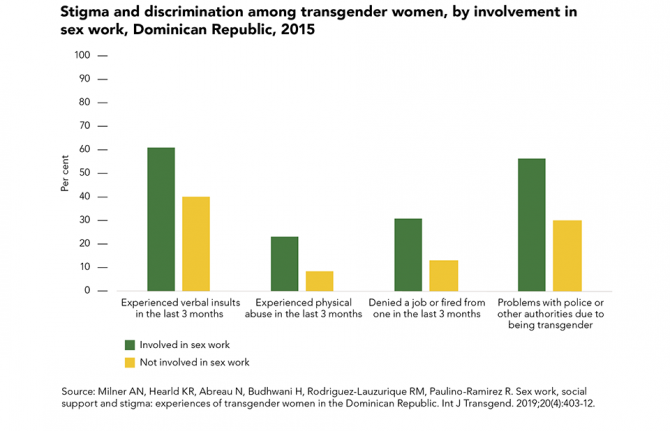 Transgender sex workers face frequent abuse
Transgender sex workers face frequent abuse

29 March 2022

Feature Story
2.5 million people living with HIV in India
04 July 2007
04 July 2007 04 July 2007Revised estimates show lower HIV prevalence in India
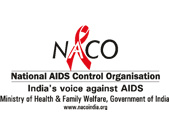
The Indian National AIDS Control (NACO), with support from national and international experts including UNAIDS and WHO, have used new and improved data and enhanced methodology to produce revised AIDS estimates for India.
The revised estimates show that in 2006, some 2.5 million people were living with the virus and that HIV prevalence among adults was around 0.36%.
Estimates for previous years (since 2002) have also been revised to give a more accurate picture of the trend of the epidemic in India over the past few years.
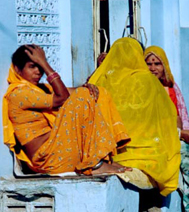
The revised estimates have been possible largely due to three main factors; a new population-based survey which included an important HIV component; expanded sentinel surveillance which included groups at higher risk of HIV infection, and revised methodology to make the best use of the new data sources.
The estimates give a better understanding of how India’s AIDS epidemic is developing and the new information will be essential in informing AIDS programming in India for the future.
Links:
Press release: 2.5 million people living with HIV in India ( en | ru | fr | es )
Fact sheet: India's data collection process (surveys and surveillance)
Fact sheet: Methodology behind India's estimates
Q & A on India’s revised AIDS estimates
Excerpts from a briefing call on HIV methodologies in India
2.5 million people living with HIV in India
Press release and statements:
Press release: 2.5 million people in India living with HIV ( en | ru | fr | es )
UNAIDS press statement: India expands monitoring of AIDS epidemic (12 June 2007)
Statement on HIV prevalence estimates in India (08 June 2007)




